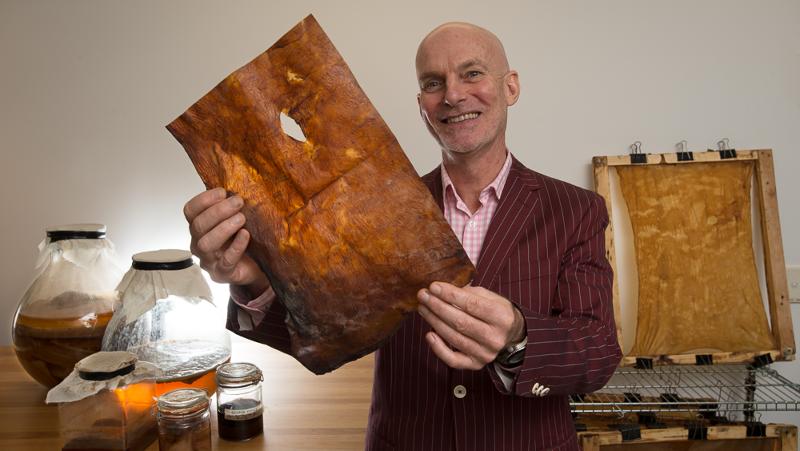
In a world in which petro-chemicals have a finite life and concerns are growing about the treatment of animals, QUT’s fashion students are creating cutting edge clothes from homemade ‘vegan leather’.
Their experiments with bio-textiles made from fermented kombucha curds will be on display at CreateX, a festival on Sunday 28 August to celebrate the expansion of QUT’s Creative Industries Precinct, where the public can also make their own kombucha jewellery.
A collision of creativity and technology, CreateX, will offer a day of dazzling interactive performances and events, immersive games, films, robotics displays, talks, panels and workshops, including one in which people can make their own designer bio-textile fashion accessories and leave with a sample of live kombucha cultures.
"Kombucha fabric is a natural, sustainable, biodegradable and reusable material,” said senior QUT fashion academic Dean Brough.
“And it’s versatile – it can be cut, stitched, moulded, glued, oiled, dyed, painted, waterproofed and laser-etched.
“Making kombucha fabric is almost like brewing beer. We produce it by fermenting tea using a symbiotic colony of bacteria and yeast, or SCOBY. This forms a fast-growing curd on the surface which we harvest, wash and dry to make a material of a strength and texture somewhere between leather and paper.”
QUT has been partnering with The Edge, State Library of Queensland, since 2014 to research how the bio-textile can be modified for different purposes and worked into clothing and fashion artefacts, as well as how it could be scaled up for industrial manufacturing.
It’s one of only a few kombucha bio-textile research programs in the world and the only one in Australia.
The Edge Science Catalyst, Dr Peter Musk said students had already produced briefcases, handbags, shirts, shoes, vests, jewellery and even whole outfits.
“This research is fascinating and fun – we are investigating the properties of what is essentially a brand new textile,” Dr Musk said.
“We’ve come a long way in the experimental process – exploring which dyes work best with the material, determining the best ways to shape and join it, finding how to waterproofing it, and adding reinforcing materials like cotton gauze to the growing curd to make the product stronger.”
QUT fashion academic Dr Alice Payne said there is a growing field in which fashion design intersects with biotechnology.
“Bio-artists Oron Catts and Ionat Zurr have created ‘victimless leather’ grown from cultured cells. Suzanne Lee in the UK and Sacha Laurin in the US are each working with Kombucha material. Although still speculative, these collaborations between science and design point to new material applications for fashion,” Dr Payne said.
“Our work contributes to this area through testing both the optimum growing conditions for the textile and its application to construct durable fashion artefacts.
“What we really like about kombucha fabric is that it’s a completely democratic material – anyone can obtain the cultures, grow their own bio-textile and have a go at making something. It fits today’s maker culture like the proverbial glove.”
Dr Payne encouraged participants in the Shared Harvest: a vegan bio-textile fashion future workshops at CreateX to take home live cultures to grow and share with family and friends.
“We’d love the public to spread the love of vegan leather and share their own discoveries and experiments on social media with the hashtag #QUTcreatex,” Dr Payne said.
The $87 million expansion of the Creative Industries Precinct makes it the most sophisticated and technically advanced creative space in Australia.
The centrepiece of the new development is a six-storey building (Z9) accommodating QUT’s dance, drama, music, visual art, creative writing and animation and research programs. It pulses with a state-of-the-art digital backbone and its design principles celebrate transparency, connectivity and an interdisciplinary approach.
For more information on CreateX and to book into a vegan bio-textile workshop, visit the website.
Media contact:
Kate Haggman, QUT Media, 07 3138 0358, kate.haggman@qut.edu.au
After hours Rose Trapnell, 0407 585 901, media@qut.edu.au




